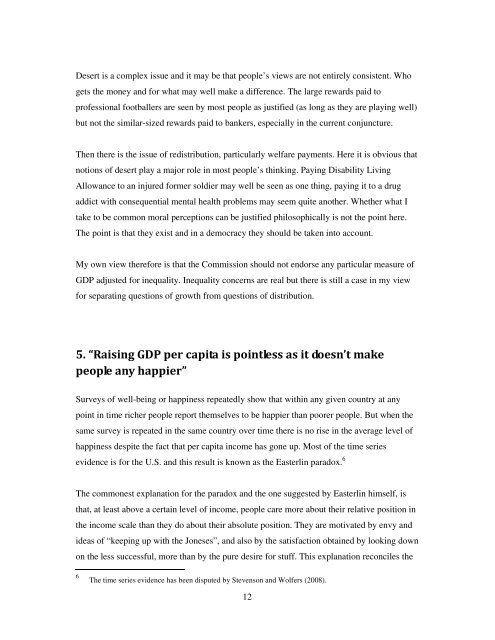Create successful ePaper yourself
Turn your PDF publications into a flip-book with our unique Google optimized e-Paper software.
Desert is a complex issue and it may be that people’s views are not entirely consistent. Who<br />
gets the money and for what may well make a difference. The large rewards paid to<br />
professional footballers are seen by most people as justified (as long as they are playing well)<br />
but not the similar-sized rewards paid to bankers, especially in the current conjuncture.<br />
Then there is the issue of redistribution, particularly welfare payments. Here it is obvious that<br />
notions of desert play a major role in most people’s thinking. Paying Disability Living<br />
Allowance to an injured former soldier may well be seen as one thing, paying it to a drug<br />
addict with consequential mental health problems may seem quite another. Whether what I<br />
take to be common moral perceptions can be justified philosophically is not the point here.<br />
The point is that they exist and in a democracy they should be taken into account.<br />
My own view therefore is that the Commission should not endorse any particular measure of<br />
GDP adjusted for inequality. Inequality concerns are real but there is still a case in my view<br />
for separating questions of growth from questions of distribution.<br />
5. “Raising GDP per capita is pointless as it doesn’t make<br />
people any happier”<br />
Surveys of well-being or happiness repeatedly show that within any given country at any<br />
point in time richer people report themselves to be happier than poorer people. But when the<br />
same survey is repeated in the same country over time there is no rise in the average level of<br />
happiness despite the fact that per capita income has gone up. Most of the time series<br />
evidence is for the U.S. and this result is known as the Easterlin paradox. 6<br />
The commonest explanation for the paradox and the one suggested by Easterlin himself, is<br />
that, at least above a certain level of income, people care more about their relative position in<br />
the income scale than they do about their absolute position. They are motivated by envy and<br />
ideas of “keeping up with the Joneses”, and also by the satisfaction obtained by looking down<br />
on the less successful, more than by the pure desire for stuff. This explanation reconciles the<br />
6 The time series evidence has been disputed by Stevenson and Wolfers (2008).<br />
12


